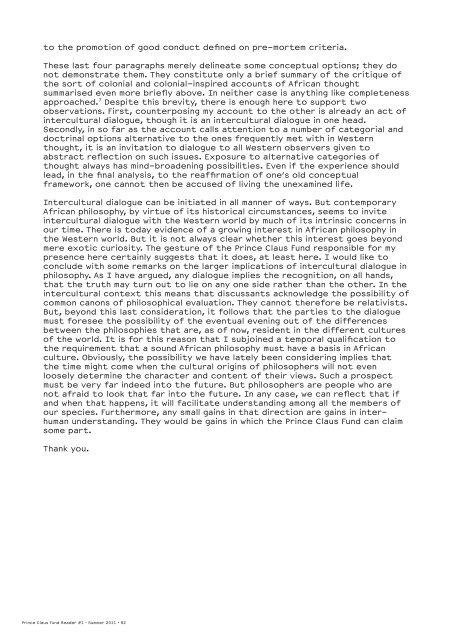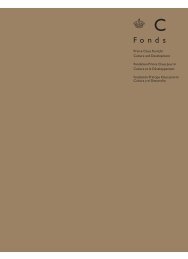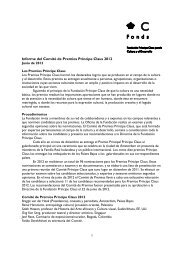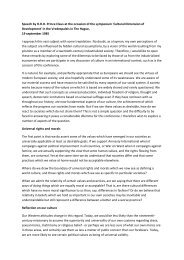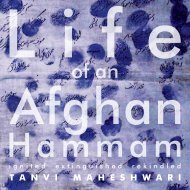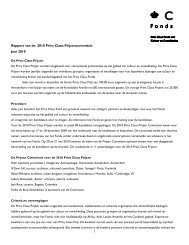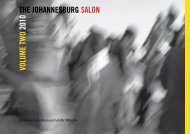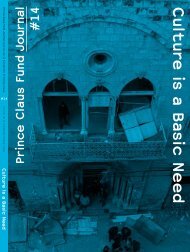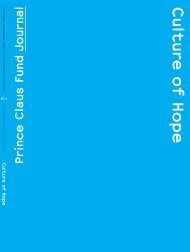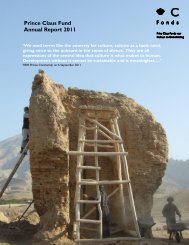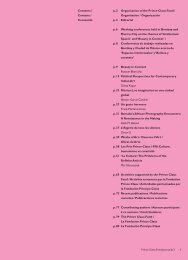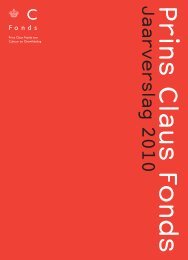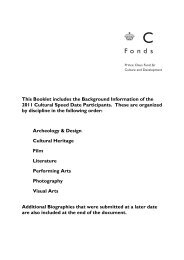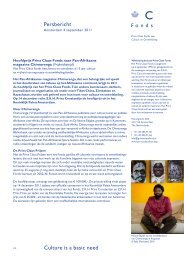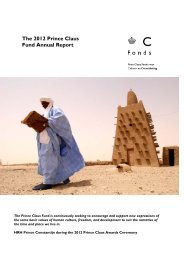3 summer 2011 - Prince Claus Fund
3 summer 2011 - Prince Claus Fund
3 summer 2011 - Prince Claus Fund
- No tags were found...
Create successful ePaper yourself
Turn your PDF publications into a flip-book with our unique Google optimized e-Paper software.
to the promotion of good conduct defined on pre-mortem criteria.These last four paragraphs merely delineate some conceptual options; they donot demonstrate them. They constitute only a brief summary of the critique ofthe sort of colonial and colonial-inspired accounts of African thoughtsummarised even more briefly above. In neither case is anything like completenessapproached. 7 Despite this brevity, there is enough here to support twoobservations. First, counterposing my account to the other is already an act ofintercultural dialogue, though it is an intercultural dialogue in one head.Secondly, in so far as the account calls attention to a number of categorial anddoctrinal options alternative to the ones frequently met with in Westernthought, it is an invitation to dialogue to all Western observers given toabstract reflection on such issues. Exposure to alternative categories ofthought always has mind-broadening possibilities. Even if the experience shouldlead, in the final analysis, to the reaffirmation of one’s old conceptualframework, one cannot then be accused of living the unexamined life.Intercultural dialogue can be initiated in all manner of ways. But contemporaryAfrican philosophy, by virtue of its historical circumstances, seems to inviteintercultural dialogue with the Western world by much of its intrinsic concerns inour time. There is today evidence of a growing interest in African philosophy inthe Western world. But it is not always clear whether this interest goes beyondmere exotic curiosity. The gesture of the <strong>Prince</strong> <strong>Claus</strong> <strong>Fund</strong> responsible for mypresence here certainly suggests that it does, at least here. I would like toconclude with some remarks on the larger implications of intercultural dialogue inphilosophy. As I have argued, any dialogue implies the recognition, on all hands,that the truth may turn out to lie on any one side rather than the other. In theintercultural context this means that discussants acknowledge the possibility ofcommon canons of philosophical evaluation. They cannot therefore be relativists.But, beyond this last consideration, it follows that the parties to the dialoguemust foresee the possibility of the eventual evening out of the differencesbetween the philosophies that are, as of now, resident in the different culturesof the world. It is for this reason that I subjoined a temporal qualification tothe requirement that a sound African philosophy must have a basis in Africanculture. Obviously, the possibility we have lately been considering implies thatthe time might come when the cultural origins of philosophers will not evenloosely determine the character and content of their views. Such a prospectmust be very far indeed into the future. But philosophers are people who arenot afraid to look that far into the future. In any case, we can reflect that ifand when that happens, it will facilitate understanding among all the members ofour species. Furthermore, any small gains in that direction are gains in interhumanunderstanding. They would be gains in which the <strong>Prince</strong> <strong>Claus</strong> <strong>Fund</strong> can claimsome part.Thank you.<strong>Prince</strong> <strong>Claus</strong> <strong>Fund</strong> Reader #1 · Summer <strong>2011</strong> · 82


